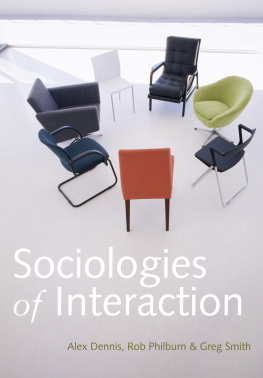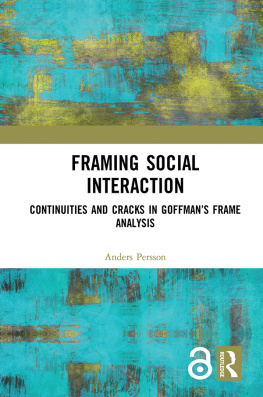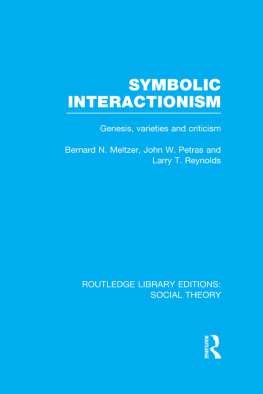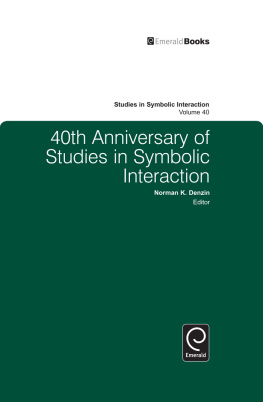Sociologies of Interaction
Copyright Alex Dennis, Rob Philburn and Greg Smith 2013
The right of Alex Dennis, Rob Philburn and Greg Smith to be identified as Authors of this Work has been asserted in accordance with the UK Copyright, Designs and Patents Act 1988.
First published in 2013 by Polity Press
Polity Press
65 Bridge Street
Cambridge CB2 1UR, UK
Polity Press
350 Main Street
Malden, MA 02148, USA
All rights reserved. Except for the quotation of short passages for the purpose of criticism and review, no part of this publication may be reproduced, stored in a retrieval system, or transmitted, in any form or by any means, electronic, mechanical, photocopying, recording or otherwise, without the prior permission of the publisher.
ISBN: 978-0-7456-7202-1
A catalogue record for this book is available from the British Library.
The publisher has used its best endeavours to ensure that the URLs for external websites referred to in this book are correct and active at the time of going to press. However, the publisher has no responsibility for the websites and can make no guarantee that a site will remain live or that the content is or will remain appropriate.
Every effort has been made to trace all copyright holders, but if any have been inadvertently overlooked the publisher will be pleased to include any necessary credits in any subsequent reprint or edition.
For further information on Polity, visit our website: www.politybooks.com
Contents
Introduction
Social interaction the actions and responses of people to each others activities fills our everyday lives. The phone rings and we interrupt our conversation with a family member in order to answer it; we get on the bus and quickly scan the area to choose a place to sit but not just anywhere; we enter an elevator and find the only other occupant is a senior manager where we work and momentarily feel uncomfortable; we invite a friend to lunch and there is a hesitation before she turns us down, proffering a plausible excuse. These instances of social interaction are the stuff of our daily lives, at home and at work, with our friends and with strangers. Two points can be made straightaway. One is that such ordinary face-to-face dealings with one another make up the world of daily life, a world that is for us what Alfred Schutz called a paramount reality. The world of daily life is paramount in our experience because it provides us with a sure sense of our being in the world that this really is it for our own existence and that of others. The second point is that social interaction in everyday life is not haphazard but structured, patterned and orderly. That structure, pattern and orderliness indicates its socially organized character. It is thus not surprising that sociologists have paid close attention to everyday instances of social interaction in order to discover the sources and nature of that orderliness.
Over the past half-century, sociology has accumulated a significant body of knowledge about social interaction. The close sociological understanding of practices of social interaction and the forms and processes assumed by these practices was developed by three traditions of sociological work: symbolic interactionism (as defined by Herbert Blumer and Everett C. Hughes), ethnomethodology (as defined by Harold Garfinkel) and conversation analysis (as defined by Harvey Sacks). We might follow what has become a convention and abbreviate these as the approaches of SI, EM and CA. The important and highly original contributions of Erving Goffman should also be considered alongside these traditions. While Goffman can be regarded as a symbolic interactionist, his ideas also go beyond that approach and impact on how we might understand both spoken interaction and the routine establishment of everyday order and in some respects act as a bridge between these perspectives, revealing their similarities and differences.
We want to alert readers of this book to the scope of these three traditions that make up the core of contemporary sociological approaches to interaction. While sociologys topics and approaches often seem unduly subject to pressing social issues and current intellectual fads and fashions, the work we have selected seems to us to form a set of robust traditions within which a modest cumulative knowledge can be traced, and upon which the myriad of contemporary interactionist empirical studies rest. In our view, the sociologies this book examines represent one of contemporary academic sociologys most understated achievements. One of our aims in writing this book is to curate these sociologies, to exhibit exactly what it is that makes them distinctive and productive as traditions of sociological work.
Our book examines, compares and evaluates these leading interactionist approaches to sociology. Each of the three traditions we consider might be regarded as alternate sociologies that is, alternatives to mainstream, conventional sociological work, especially as it was practised in the second half of the twentieth century in the USA, the land where sociology has been most fully developed and most thoroughly professionalized. Similarly, SI, EM and CA are rooted in US sociology but have become diffused across the world, especially in places where sociology has flourished such as Europe, Australasia and Japan. Sometimes they are situated as arcane specialties. At other times they are claimed as the loyal opposition. Occasionally it is maintained that the opposition has evaporated and that the interactionist sociologies now have been incorporated by mainstream sociology.
Whatever view is taken of their current status, SI, EM and CA originated as alternate sociologies that, as we shall show, were critical of the analytical and methodological practices of the established orthodoxies of academic sociology. These points of divergence are vital in placing each tradition in the context of debates about the nature of human action and the methods appropriate to its apprehension. Our book discusses these broader methodological issues and seeks to show how they are worked out in empirical studies. Our primary concern in articulating the three sociologies of interaction lies with these wider questions about method rather than with research methods as such. Certainly, we shall discuss questionnaires and interviews, observational and documentary research, but ours is not a research methods book. The interested reader is directed to texts such as ten Have (2007), Hammersley and Atkinson (2007) and Silverman (2011) for more detailed guidance about how to conduct studies in the styles outlined in our text.
We do not want to suggest that the three sociologies of interaction that we have identified are templates for doing studies. Certainly there are shared methodological and analytical precepts. However, there is also much variation and scope for innovation within each approach, as we try to convey in the discussions of specific studies.
We have organized the book into eight chapters. In the first three of these we will introduce the three key traditions outlined above symbolic interactionism (including a discussion of pragmatism), ethnomethodology (including a discussion of phenomenology) and conversation analysis (including a discussion of the interaction order). Following this, chapters 4 to 8 will discuss specific concerns for all three of these traditions.











